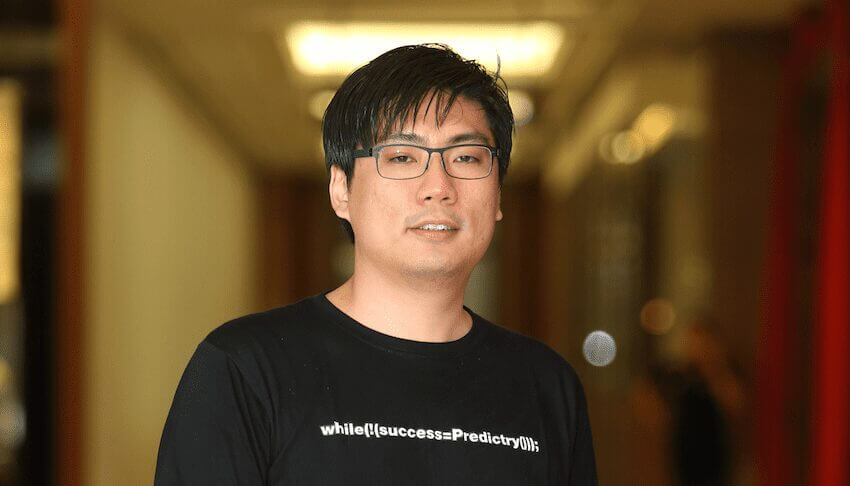ST Chua, the CEO of Predictry is a seasoned co-founder and business developer. His experience includes founding and successfully exiting a hospitality business and developing a multi-million online daily-deal business across 29 countries globally for Rebate Networks, based out of Germany. Prior to that, he played an integral part of Maxis’ corporate strategy division where he was heavily involved in new business and overseas expansion. ST has a unique mix of dabbling in both online and offline experiences ranging from financial technology to baby products distribution businesses. He is also a management consultant, advising companies on go-to-market strategies and how to set up a tech venture capital. ST holds an MBA from INSEAD, France.
In your own words what is Predictry?
Predicty is a recommendation service that can be inserted to any e-commerce, marketplace or content sites with the goal to increase their conversion by recommending only relevant items that we think may best relate to the particular user using a mixture of predictive analytics algorithms and classifying that particular user based on his/her peers with similar interest.
We allow sites to recommend like Amazon, “those who bought this also bought that, “items normally bought together” and the many variations of it.
Another example for those who are not Amazon users is for example Linkedin, where you see listings of “people you may know…” or “people also viewed…”.
How did you come up with the idea of Predictry?
This idea of recommendation is not new and is made popular with Amazon where 35% of their sales is due to their recommendation engine. I am a huge Amazon Kindle user where out of 8 books I buy per month, about 3-4 books are from these recommendations. I found that really powerful as I wouldn’t have known about these books in the first place and those books that have been recommended suits my taste.
Secondly, I have been in the daily-deals business where we bombard customers with various discounted deals daily. Problem was how the business can personalise its approach to get the right deals to the right customers.
Thirdly, having the experience running an e-commerce site, I know that converting traffic to sale is always a problem. How can we increase conversion?
Last but not least, we have our sister company Perfectsen, a company providing personal finance management solution to banks, where it process tons of transactional data daily to help users categorised their transactions automatically. We needed to develop an analytics engine to further make sense of the data.
Joining these 4 firsthand experiences brought the idea of creating a service to allow sites big and small to recommend like Amazon.
Could you walk us through the process of starting up Predictry?
I believe in the lean methodology in starting up a business, going out to test the market early and constantly verifying assumptions and make changes along the way.
We have lots of conversations with our early adopters to hear out their needs and expectations of our Predictry recommender before we set forth to build them. Our approach is very different from others as we prefer a very high touch with our clients till this day to understand their needs and pain points better.
Did you encounter any particular difficulties during startup and if so, how did you guys overcome it?
We generally faced 2 difficulties. Firstly is funding. Not many investors understand what we do, the scale and in our case there’s also a gestation period to build up a significant chunk of data. The more data we get, the better our recommendation engine gets. We decided to proceed with funds internally together with MDEC’s PCF Big data grant (we are honoured to be one of the first 5 companies in Malaysia to get it when it was launched).
Secondly is getting in the right people with the right skillsets. The predictive analytics field is growing and data scientists don’t come cheap. The market is also very competitive to grab good software engineers. As for data scientist, everyone claims to be one but the good ones are a few. We are constantly on a look out for them.
How have you been developing Predictry, developmental direction?
We use a very agile method in developing Predictry where we work on increments while working closely with sites who willingly became our early adopters. We have our weekly scrum meetings to prioritise development work and daily stand-ups ensure we remain fast and agile.
Lately, we been getting request from companies to do customised machine learning projects that involves offline data and also loyalty elements. We are always happy to explore new revenue streams.
What kind of feedback did you get for Predictry?
The feedback is very positive, but it depends on the familiarity of the product. In Malaysia where Amazon is not here, not many understand how it works and think that it is the same as remarketing or retargeting which is not. But in Europe or even in Singapore, the moment we say recommendation engines ala Amazon, they already get the idea and understand the value it brings to their website
Do you face a lot of competition in this industry? What is your strategy against your competition?
We don’t face that many competition in Asia but the competitors in this arena are really the 800 pound gorillas from the West who not only have the infrastructure, but the people and clients.
For us, we only focus on one thing alone, which is helping our clients to convert better. We take a very personal approach in understanding our clients’ needs and business.
With our team that has strengths in business consulting, User Experience (UX) design and having run e-commerce operations before, we value add not only from the technology stand point but from end-to-end of our client’s business. We find that our clients are very appreciative in our ability to provide such end-to-end services.
Have you developed any industry insights that you could share?
The predictive analytics industry is huge, with many usages ranging from predicting traffic trends to stock markets. The amount of data being churned out per minute online is unprecedented.
In our focus which is recommendations for e-commerce, where we are trying to predict what users may buy or like. What is interesting is that more and more people are relying on recommended items simply because there is too much distraction and choices online. Quoting my colleague Stewart, “you get a paralysis of choice if you have 31 choices of ice cream compared to having a choice of only chocolate and vanilla”. That’s what Predictry tries to do as we play an increasing importance to improve website conversions by surfacing only items that is relevant to customers in relation to their taste and their peers.
As for industry, they are just starting to understand the difference between predictive analytics and business intelligence or what I call descriptive analytics. Market education needs to be continuously done especially in South East Asia to get people to understand the difference between using machine learning compared to using excel.
What is the future of the industry and how do you plan to stay relevant in this industry?
We actively seek out to understand our clients businesses and to grow with them. For example, 5 years ago in Asia, people were just buying clothes online. Now people are buying all kinds of stuff online ranging from electronics to food. Nowadays there a online marketplaces where before it was just single shops. Our recommendation engines have to be smart enough to adapt according to the industry and buying habits.
Predictive analytics and recommendations (which is a subset of it predictive analytics) is here to stay. More and more industry needs to rely on data to increase relevancy and personalisation to customers in multitude of channels and devices. I personally look forward for Predictry to be integrated with loyalty programs and wearables in the future. This industry is still at its infancy and there is a lot of room to grow.
Were there anything that disappointed you initially?
For me, it is speed. With marketing and business development in my DNA, naturally I prefer to go out to the market faster. However, this product is highly complex in nature and requires time to build it up. We have to ensure that our system has an enterprise grade stability and does not affect the performance of our client’s websites or mobile apps where any slowdown will result in a loss of user experience and potentially revenue.
What do you think about being an entrepreneur in Asia? Is it harder or easier, why?
I’ve been lucky to have experienced the best of startup worlds, in Europe and Asia. It is never easy as an entrepreneur regardless if you are in KL, Berlin or Silicon Valley. I have started start-ups in London to Singapore. But I choose Asia to be my base simply because with all the odds against you being a startup, you have to take into consideration where you have the deepest market knowledge, network and resources that you can tap to that could increase your chances of startup success.
One thing that is easier in Asia especially in Singapore or Malaysia is there are government grants that as a local you can tap into which helps a lot. In addition, the cost is relatively cheaper to develop and start something here compared to the Western world. Your living cost, hiring people and office rentals in the West is sure to put a strain on your cashflow and in any entrepreneur venture, prolonging your runway is the name of the game.
What is your opinion on Asian entrepreneurship vs Western entrepreneurship?
In entrepreneurship, fundamentally we are the same. Everyone is hunting for a market to go for and a need to solve a pain-point. But the focus, approach and environment may be different.
Having been a part of the European startup scene, I felt there are a lot more support and people are more open there to share knowledge, market info, investor contacts, etc whereas people in Asian it can be quite extreme. On one hand, people are more cautious, closed and not so willing to share what they know. On the other hand, it is the case of blind leading the blind where people are willingly giving advice not knowing that without the experience, some advice may be detrimental for the start-ups themselves.
In terms of environment, it is easier to also start something in the West to test an idea out when most are already connected online, used to online transactions and more open or vocal in giving feedback whereas in Asia it is much more challenging. Try sending a survey out to rate 1-5 of your product, in most cases you will see a 3 and no remarks in the comment field which is not very helpful for a startup. Asians are too nice sometimes.
Focus of entrepreneurship varies too as in Asia we have a lot more pressing infrastructure matters to figure out ranging from online payments to logistics.
What is your definition of success?
To truly live the life that I want, do what I want to do, while being happy and without regrets knowing that I did my best.
Why did you decide to become an entrepreneur?
I have always had the entrepreneurial spirit even within a corporate environment. In my corporate life previously, I was always involved in launching new businesses. I thought if I can do it for others why not do it for myself since I really enjoy making ideas to reality.
In your opinion, what are the keys to entrepreneurial success?
Relentlessness. Have a just do it mentality.
Comfortable with calculated risk. Make sure you cover your base but don’t fear failure, keep trying and learning.
Discipline. Be systematic and build processes early on. Operationalise every approach on a clockwork manner.
One should also keep in mind never to fall in love with your idea, and know when is a time to let go.
As a business consultant and startup advisor, I enjoy the process of poking holes to the idea or what I call “kill your baby”. Yes, it sounds morbid. That’s when we look at all angles and possibilities how it can fail. Validate your ideas and assumptions thoroughly. In addition, always ask what must happen and in what condition for your assumptions to be true.
Any parting words of wisdom for entrepreneurs out there from your personal experience?
Not everyone is cut out to be an entrepreneur and that is ok and there’s no shame. It’s a hard life and a very bumpy one. The truth is 99.9% of start-ups fail. But if you do succeed, never forget to always continue building value, to the ecosystem, your shareholders, partners, customers and employees. There are too many who only thinks of building short-term value solely for themselves.
Connect
Company linkedin: https://www.linkedin.com/company/predictry
Personal linkedin: https://my.linkedin.com/in/stchua





























